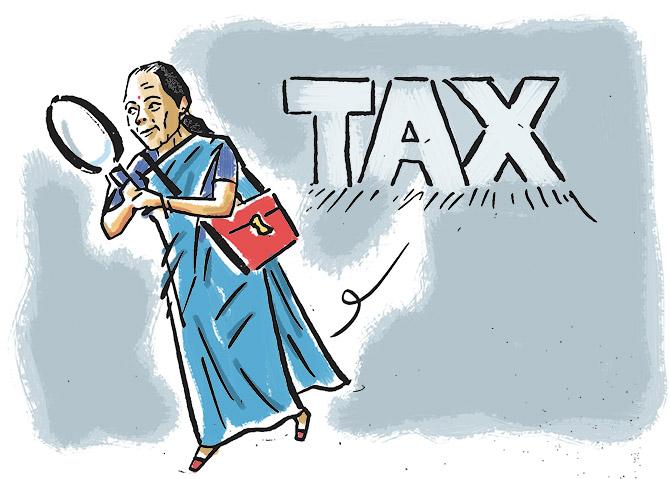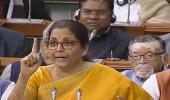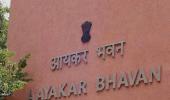In an online chat with Rediff.com readers, G Srikanth, partner, GSV Associates, chartered accountants, Chennai and member of the Institute of Cost and Management Accountants, answered queries about the new income tax proposals mooted in the Union Budget 2020-2021.
Illustration: Dominic Xavier/Rediff.com

The unedited chat transcript:
Kumar Resan: No benefit for the salaried tax payers. std deductions exemptions were cut to excise new tax slab
Srikanth Ganapathy: No additional deductions given to salaried class. You can choose the new tax regime if that is favourable to you.
Hazal: I have invested in Shares, Mutual funds, PPF and ULIP. Will Budget 2020-21 have any impact on these things? Is there any change required?
Srikanth Ganapathy: Dividends from shares, mutual funds etc. will now be taxed in your hands at the rate at which you fall. Earlier, these were exempt in your hands but taxed in the hands of the company.
Gambhir Harbir: Good afternoon, Srikanth. Could you tell us how the new tax structure without any exemptions is better or not than the existing tax structure for those belonging to tax brackets over Rs 5 lakh?
Srikanth Ganapathy: For the salaried individuals who are in receipt of HRA, LTC and of course Standard deduction, and if they also have 80C investments upto 1.50 lakh, calculations show that up to Rs 15 lakh of salary, the new regime is not favourable.
Whether the new regime is favourable or not is strictly case-specific and we cannot generalise.
Lalji Margasahayam: Dear Srikanth, What is your view on the overall budget? Is it beneficial to the common man?
Srikanth Ganapathy: I don’t see anything beneficial to the common man from the direct tax proposals. On the macro economic issues, much depends on implementation and we cannot go by budget announcements.
Amit Shellar: Sir, Will having five different tax bracket help common taxpayers or confuse them more?
Srikanth Ganapathy: It is likely to confuse the common man because every year he has to do a comparison before choosing the method.
ria dsouza: Dear Srikanth, could you tell us who benefits the most as per the new and old tax rates?
Srikanth Ganapathy: Those who have income from other sources (not salary) and those who do not have any tax saving investments. They will benefit the most.
subramanya rao: Sir I usually claim now investments under SCSS, Life insurance, Standard deduction, interest exemption on investments, donations to charities. Which of these are to be considered for new tax slabs?
Srikanth Ganapathy: None of these are permissible when you compute the tax under the new regime!
Arvind Jaiswar: Sir, is Rs 40,000/- ceiling for Saving Bank interest free from TDS in current FY & in new FY.
Srikanth Ganapathy: This is available as usual if you do not opt for the new regime. If you opt for the new regime, this is not applicable.
Wish to correct the answer that No TDS upto 40,000 still remains even if you opt for the new taxation regime.
Amit Hajarnis: Good Afternoon, how does the abolishment of Dividend Distribution Tax favour my individual tax filing, if in case i transfer the funds from my private limited company in capacity of director?
Srikanth Ganapathy: If your effective tax rate inclusive of cess etc. is less than 20% you benefit because the DDT was also working out to a little over 20% including the cess etc. So, you end up paying lower taxes. If you are taxed at say 30%, you would end up paying more.
praisy chanana: Dear Sir, I would like to know which regime is better for a salaried person in salary bracket over 20 lakh per annum and over 30 lakh per annum. Not claiming any deduction and taking availing benefit of new slabs or continuing with existing slabs. Have current investments under 80C (1.5L), HRA and also planning for a house loan in future.
Srikanth Ganapathy: If I only consider the 80C investment of Rs.1.50 lakh, the new regime is definitely better.
Eknath Gangulee: What is the Medical expenditure for self and dependant under Section 80DDB of the Act?
Srikanth Ganapathy: Rs. 40 000 max. If you also incur for a senior citizen, it is upto 1 lakh
Jayendra: Does this Budget mean that savings need to be decided by individuals themselves, there is no forced savings like 80C?
Srikanth Ganapathy: That's right although some savings such as PF are forced on the salaries persons. Now you need not save only to save on taxes.
vishvesh margasahayam ramachandra: Does the new tax exclude the municipal and 30% for repairs while computing just like excluding hra, lta, food coupons, 80C?
Srikanth Ganapathy: No. These deductions from HP income still remain even if you chose the new tax regime.
Umesh Chandra: My salary is 24L per annum. Will it be any change for me?
Srikanth Ganapathy: You need to arrive at your tax and taxable income after reducing all 80C type deductions, exempted allowances under Salary income. Then compare with the tax under the new regime which works out to Rs. 4.57 lakh without cess.
afroz alam: Dear Sir, Don't you think this new tax slab will put negative impact on real estate, as people who wish to buy houses considering some tax benefits will not be encouraged now.
Srikanth Ganapathy: Yes, to some extent.
khaja ahmed: Hi, i apply only HRA (1lac) & Child's tuition fee (70k). Is the new tax regime better for me if i forego these (HRA/Tuition fee)?
Srikanth Ganapathy: What is your annual salary? Depends on that.
Swapna Vijay: What all exemptions are removed as per the new IT slab?
Srikanth Ganapathy: For salaried class, HRA, LTC, Std Ded, and a few other allowances are removed. Besides interest on Home loan for self-occupied property, deduction from family pension (1/3) and all Ch VIA deductions such as 80C, mediclaim, pension scheme (NPS is still there) are removed.
Sunil Singh: Is NPS is exempted in new tax slab?
Srikanth Ganapathy: NPS benefit can be taken under the new regime
debadutta dashpanda: Currently the employer contribution to PF (12% of basic) is exempted from taxable salary under 80C. What will happen to this PF component in new tax regime? Will EPF be still considered as an exemption in new tax regime?
Srikanth Ganapathy: There is no change in taxability of employer’s contribution up to 12%.
shibaji chatterjee: My ctc is 25 lakh. I invest 150000 in PPF, 120000 is LIC premium and 25000 is mediclaim premium. Also I pay a rent of Rs 25500 in Mumbai. Which slab should I go for?
Srikanth Ganapathy: Assuming that your exempt HRA is about 3 lakh, I would suggest you be in the existing regime itself as the tax works out to Rs. 4.13 lakh as against 4.87 lakh in the new regime.
Rajesh Choudhary: I am not clear about individual tax slabs, at some sites it is 5% for the slab of 2.5 to 5, pl. clear
Srikanth Ganapathy: 5% for income from 2.5 lakh to 5; 10% for 5 to 7.5 lakh; 15% for 7.5 to 10 lakh; 20% for 10 to 12.5 lakh; 25% for 12.5 to 15 lakh; 30% for income above 15 lakh.
Suresh Sindhi: Whether confusion signals are sent on the aspects of immediate consumption (as more money will be taxpayer’s hand) versus long term savings through introducing two ways of computing individual taxes. Would like to hear your views.
Srikanth Ganapathy: I would agree. When growth depends on investments which depend on savings, the wisdom of introducing a new regime to incentivise consumption is not understandable. But I think most people will stay with the old regime and that will by default help long term growth.
SUNIL Mahajan: Sir, what is the exemption/saving allowed in new regime?
Srikanth Ganapathy: Under the new regime, in Chapter VIA which deals with tax saving schemes and which you deduct from the Gross Total Income, only Sec 80CCD(2) - NPS upto Rs. 50,000 is available. If you are a businessman, you get deduction u/s 80JJAA - incentive for giving employment.
Jayanth Rao: What about the exemption or deduction provided for maintenance and repairs for the properties with respect to rental income? Is that retained in the new tax regime
Srikanth Ganapathy: Yes, retained.
G Geeta: The best will be to show a calculation of Tax under both the existing and new one for a salary of Rs 20 lakh showing the various exemptions and ultimately what the tax will be?
Srikanth Ganapathy: Under the new regime - Rs. 20 lakh of salary will get you a tax of 337500 without including cess. Under the old regime, assuming you are salaried, have standard deductions and have invested in 80C for say 1.50 lakh, then your tax will be 352500.
If you also have some exempted HRA of say Rs. 1 lakh, the tax will be 322500. So you can compare.

.jpg)









 © 2025
© 2025